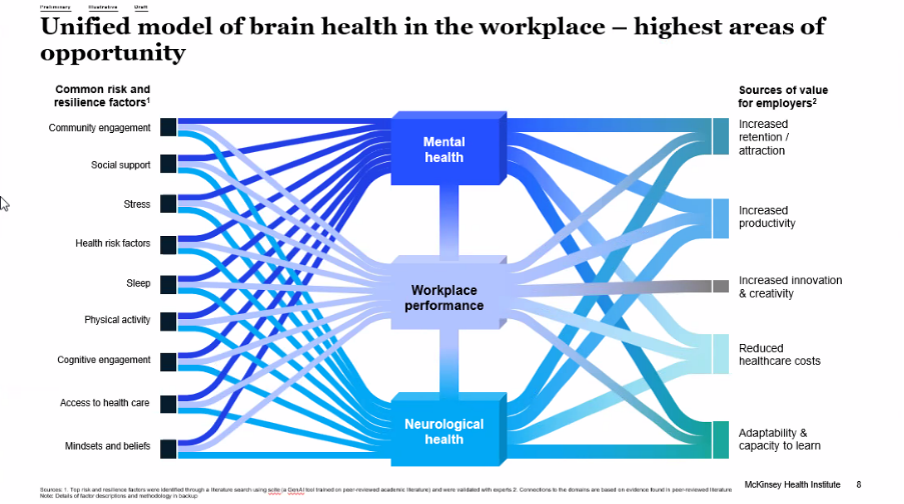Roundtable #12: Business and Brain Health at the 79th United Nations General Assembly
In September, the Business Collaborative for Brain Health met to share insights from the panel discussion: Business and Brain Health, at the Science Summit, 79th United Nations General Assembly (UNGA) “Brain Days”.
Brain Days was a two-day side event leading into UNGA, hosted by the United Nations, the European Brain Council, UsAgainstAlzheimer’s, Davos Alzheimer’s Collaborative, Brain Capital Alliance, UNICEF, and Meadows Mental Health Policy Institute, with support from many other organizations.
The panel session included Collaborative advisors and founding partners such as Shell and GN Group, as well as other leaders from A&O Shearman, Morgan Stanley, and Southern Company. Panelists explored the impact of brain health in the workplace and the importance of securing leadership buy-in to implement brain health initiatives.
During the panel session, The Collaborative, in partnership with HERO and Mercer, publicly launched the new Brain Health Best Practice Score -- a new feature of the HERO Health and Well-Being Best Practices Scorecard in Collaboration with Mercer©. The HERO Scorecard helps organizations learn about best practices for promoting overall workplace health and well-being, as well as how to discover opportunities to improve and measure progress over time.
The Brain Health Best Practice Score is an educational resource to help organizations assess their health and well-being initiatives for promoting brain health. This new tool is freely available to companies of all sizes.
The launch of the Brain Health Best Practice Score represents a major milestone for The Collaborative and its partners, and it is a testament to the group’s efforts over the last year to provide employers with more science-backed resources to measure brain health.
To date, nearly 500 employers have completed the Scorecard, and discussions are underway with those employers to explore the implications of their results on both workforce and business outcomes. Employers interested in participating can complete the Scorecard at businessforbrainhealth.org/scorecard.
Karen Moseley, president and chief executive officer of HERO, highlighted the presence and engagement from state leaders in the audience at Brain Days. She also noted a significant spike in website traffic and Scorecard completions following the announcement of the new Brain Health Best Practice Score.
Developing a Visual Framework of Brain Health in the Workplace
During the roundtable, Kelly O'Brien, vice president of prevention, announced a new partnership among UsAgainstAlzheimer’s, Davos Alzheimer’s Collaborative, and the McKinsey Health Institute to create a unified visual framework that will guide employers seeking to understand how neurological health, mental health and workplace performance intersect.
Featured speaker Darshini Mahadevia, from the McKinsey Health Institute, opened the conversation by highlighting the pivotal role of employers in the "brain economy" - an emerging economic paradigm that emphasizes brain health as a key driver of economic growth. Given the significant financial opportunity in promoting brain health in the workplace, Mahadevia proposed one definition for employers to consider: brain health as the intersection of three distinct, yet interconnected, disciplines - mental health, neurological health, and workplace performance. By adopting this holistic perspective, business executives could better align their efforts to cultivate a brain skills-driven workforce, and ultimately enhance their organizations' economic outcomes.
(Source: The McKinsey Health Institute)
She emphasized that while solutions like mindfulness programs and brain training can be helpful, they are insufficient on their own. She stressed, "We're not going to yoga our way out of this problem." A more comprehensive, holistic strategy is necessary to ensure meaningful change. Employers need a framework to optimize investments and interventions that directly impact brain health in the workplace.
To navigate this complex landscape, the McKinsey Health Institute collaborated with UsAgainstAlzheimer’s and the Davos Alzheimer’s Collaborative to create a unified conceptual framework of the shared risk and resilience factors and common outcomes across the disciplines of mental health, neurological health and workplace performance. Through surveys and research, over 80 risk and resilience factors were identified. The teams then narrowed this list down to 21 core factors including stress, workplace culture, social support, community engagement, and sleep among other key health and performance levers. These factors are essential for employers looking to create an integrated approach to brain health that enhances organizational value, fosters innovation, improves retention, and helps reduce healthcare costs.
(Source: Business Collaborative Roundtable presentation, September 26th, 2024)
The discussion also highlighted the 9 most cross-cutting factors with the highest potential for impact, ranging from social support to physical activity. Mahadevia invited feedback from Collaborative members, emphasizing the need for ongoing collaboration to further develop this conceptual framework and ensure its effectiveness in enhancing workplace performance.
Digging Deeper: Shell’s Approach to Brain Health
Krystal Sexton, global health analytics manager at Shell, shared the company’s data-driven approach which uses insights from employee surveys to identify key risk factors for brain health. Recognizing the impact of both professional and personal stressors, Shell prioritized providing targeted support and resources to mitigate these risks. Sexton emphasized that fostering a culture of care is critical and that brain health initiatives should go beyond compliance to create a genuine commitment to employee well-being. Shell has implemented tools to help employees shift mindsets and behaviors, aiming for long-term improvements in mental health and workplace performance. This tailored approach creates a lasting impact on employee well-being and overall productivity.
One Collaborative member pointed out that cognitive health is often neglected in corporate wellness programs, despite its profound influence on overall employee well-being and productivity and advocated for a holistic approach to brain health, aligning wellness initiatives with organizational goals to improve both employee health and business outcomes.
The Business Collaborative for Brain Health (BCBH) is a collaborative of private sector partners developing innovative solutions to cognitive health throughout the lifespan. The Collaborative hosts regular roundtables to learn from experts and stakeholders and refine the work. If you’re interested in attending or participating in a roundtable discussion or want to learn more about how you can get involved with the Collaborative visit: https://businessforbrainhealth.org/


